|
|
|
Sort Order |
|
|
|
Items / Page
|
|
|
|
|
|
|
| Srl | Item |
| 1 |
ID:
119723
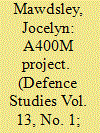

|
|
|
|
|
| Publication |
2013.
|
| Summary/Abstract |
The A400M project was seen as a flagship European armaments cooperation project from its inception. It has been farmed in two different ways ; as a break with inefficient collaborative procurement practices (the commercial fame) and as proof that European interests would outweigh national ones (the European fame).The Project's well-documented difficulties show that neither frame was wholly persuasive, but this raises questions about the viability of EU armaments policy given that it rests largely on the same assumptions.
|
|
|
|
|
|
|
|
|
|
|
|
|
|
|
|
| 2 |
ID:
164621
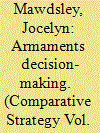

|
|
|
|
|
| Summary/Abstract |
When states make decisions on armaments policy, it is generally agreed they try to achieve combinations of foreign, security, industrial, economic, and technological policy goals alongside equipping their armed forces as efficiently as possible. It is, however, consistently argued in both the defense-economics and EU-studies literature that for European states things are (or should be) different. This article contributes to this debate by bringing together these disparate literatures to critically examine the proposition that the existence of a semi-regionalized European defense economy fundamentally changes state calculations on armaments policy. It critically examines the two main claims made about behavioral change: that European states accept a liberalized European defense market governed by the EU and make armaments decisions on a value-for-money basis, or that defense interdependence is so advanced that European states no longer need to consider their national interests because these are subsumed in the European interest. The article then considers an alternative perspective, that state behavior has not changed but is restricted by the existence of a European defense market that, intentionally or not, works to protect the interests of the biggest European arms-producing states.
|
|
|
|
|
|
|
|
|
|
|
|
|
|
|
|
| 3 |
ID:
052837
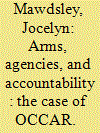

|
|
|
|
|
| Publication |
Autumn-Winter 2003.
|
|
|
|
|
|
|
|
|
|
|
|
|
|
|
|
| 4 |
ID:
118002
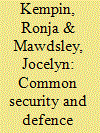

|
|
|
|
|
| Publication |
2013.
|
| Summary/Abstract |
This article argues that rather than being an emancipatory step for the EU, the Common Security and Defence Policy in its current format represents a continuation of US strategic hegemony. Using a neo-Gramscian model of hegemony, by considering both civilian and military aspects of CSDP, the article shows how US ability to export its strategic doctrine to EU member states is undiminished. It argues that respect for US military achievements is a key reason for this, but that this may lead EU states to make poor strategic decisions, which moreover may lack political and public legitimacy.
|
|
|
|
|
|
|
|
|
|
|
|
|
|
|
|
| 5 |
ID:
072796


|
|
|
|
|
| Publication |
2005.
|
| Summary/Abstract |
Almost unnoticed, over the past five years the French government has altered its attitude towards American missile defence plans. The country's most important defence firms are taking part in the technical development of National Missile Defense, even though the political elite have yet to publicly announce their participation in the programme. This paradox can only be understood through an analysis of the specifics of French security culture. The arms industry enjoys a central place in the formulation of French security and defence policy, thanks to Paris' insistence on its quest for security autonomy. French thinking on defence has also moved closer to that of America. But these policy shifts have to be protected from the accusation of being too dependent on or too close to the United States, as a refusal to accept subordination to Washington is also part of French security culture. At present, therefore, this policy U-turn is being strategically and linguistically reconstructed as a genuine French project.
|
|
|
|
|
|
|
|
|
|
|
|
|
|
|
|
| 6 |
ID:
177046
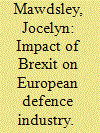

|
|
|
|
|
| Summary/Abstract |
This contribution to the discussion forum considers the impact of Brexit on European defence industry. It argues that while in the short term there is unlikely to be an institutionalised defence relationship between the UK and the EU, that the size of the UK defence budget and technological strength, coupled with NATO membership make it hard to cut the UK out of European armaments cooperation. The contribution suggests however that the uncertainty surrounding both the success of PESCO and the EDF and the outcome of the UK’s Integrated Review makes the future difficult to predict.
|
|
|
|
|
|
|
|
|
|
|
|
|
|
|
|
| 7 |
ID:
122264
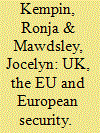

|
|
|
|
|
| Publication |
2013.
|
| Summary/Abstract |
While German commentators and politicians are primarily concerned with the economic impact of a possible 'Brexit' and the loss of a partner in EU economic negotiations, David Cameron's speech has also raised questions about the future of European security. For some in Berlin, the CSDP is unworkable without British participation; for others, the removal of the British veto would enable progress on CSDP institutions, long desired by Berlin. Here, Kempin and Mawdsley explore the apparent contradictions in German security policy, and the (possibly unwelcome) opportunities a Brexit might open up for Germany in relation to the CSDP.
|
|
|
|
|
|
|
|
|
|
|
|
|
|
|
|
|
|
|
|
|